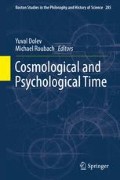Abstract
A perennial question in the philosophy of time concerns the relation between the objective “physical time” that features in empirical theories of motion and the subjective “human time” in which our own experiences unfold. This article is about one facet of this broader question: whether the phenomenon of consciousness allows us to make a principled distinction between the present and other times. A number of authors have argued that, without conscious observers, there would be no distinctions of past, present, and future. This paper defends the opposing thesis that there is no interesting connection between consciousness and presentness.
Access this chapter
Tax calculation will be finalised at checkout
Purchases are for personal use only
Notes
- 1.
- 2.
- 3.
It is not at all clear what notion of possibility we need to employ for this purpose, but let me pass over this here; see Torre (2011) for more details.
References
Baker, Lynne Rudder. 2010. Temporal reality. In Time and identity, ed. Joseph Campbell, Michael O’Rourke, and Harry Silverstein, 27–47. Cambridge, Mass.: The MIT Press.
Bourne, Craig. 2004. Future contingents, non-contradiction, and the law of excluded middle muddle. Analysis 64: 122–128.
Buhusi, Catalin, and Warren Meck. 2005. What makes us tick? Functional and neural mechanisms of interval timing. Nature Reviews Neuroscience 6: 755–765.
Canales, Jimena. 2009. A tenth of a second: A history. Chicago: Chicago University Press.
Dainton, Barry. 2008. The experience of time and change. Philosophy Compass 3: 619–638.
Dainton, Barry. 2011. Time, passage, and immediate experience. In The Oxford handbook of philosophy of time, ed. Craig Callender, 381–418. New York: Oxford University Press.
Dolev, Yuval. 2007. Time and realism: Metaphysical and antimetaphysical perspectives. Cambridge, Mass.: The MIT Press.
Dolev, Yuval. 2012. Perceiving transience. In The future of the philosophy of time, ed. A. Bardon, 56–72. New York: Routledge.
Dummett, Michael. 1991. The logical basis of metaphysics. Cambridge, Mass.: Harvard University Press.
Dummett, Michael. 2000. Is time a continuum of instants? Philosophy 75: 497–515.
Dummett, Michael. 2005. Hume’s atomism about events: A response to Ulrich Meyer. Philosophy 80: 141–144.
Forrest, Peter. 2004. The real but dead past: A reply to Braddon-Mitchell. Analysis 64: 358–362.
Forrest, Peter. 2006. Uniform grounding of truth and the growing block theory: A reply to Heathwood. Analysis 66: 161–163.
Grünbaum, Adolf. 1953. Whitehead’s method of extensive abstraction. British Journal for the Philosophy of Science 4: 215–226.
Heathwood, Chris. 2005. The real price of the dead past: A reply to Forrest and to Braddon-Mitchell. Analysis 65: 249–251.
Hoerl, Christoph. 2009. Time and tense in perceptual experience. Philosophers’ Imprint 9(12): 1–18.
James, William. 1890. The principles of psychology. New York: Holt.
Łukasiewicz, Jan. 1970. On three-valued logic. In Selected works, ed. L. Borkowski, 87–88. Amsterdam: North-Holland.
Malpass, Alex. 2009. Future tense in branching time. Unpublished manuscript.
Markosian, Ned. 1995. The open past. Philosophical Studies 79: 95–105.
Mauk, Michael, and Dean Buonomano. 2004. The neural basis of temporal processing. Annual Review of Neuroscience 27: 307–340.
McCall, Storrs. 1994. A model of the universe: Space-time, probability, and decision. Oxford: Clarendon Press.
Meyer, Ulrich. 2005. Dummett on the time-continuum. Philosophy 80: 135–140.
Myro, George. 1986a. Existence and time. In The philosophical grounds of rationality, ed. Richard Grandy and Richard Warner, 383–409. Oxford: Clarendon Press.
Myro, George. 1986b. Time and essence. In Studies in essentialism, Midwest studies in philosophy, vol. 11, ed. Peter French, Theodore Uehling, and Howard Wettstein, 331–341. Minneapolis: University of Minnesota Press.
Paul, L.A. 2010. Temporal experience. Journal of Philosophy 107: 333–359.
Prior, Arthur. 1953. Three-valued logic and future contingents. Philosophical Quarterly 3: 317–326.
Prosser, Simon. 2012. Why does time seem to pass? Philosophy and Phenomenological Research 85: 92–116.
Russell, Bertrand. 1915a. Our knowledge of the external world as a field for scientific method in philosophy. Chicago: Open Court.
Russell, Bertrand. 1915b. On the experience of time. The Monist 25: 212–233.
Thomason, Richmond. 1970. Indeterminist time and truth-value gaps. Theoria 36: 264–281.
Tooley, Michael. 1997. Time, tense, and causation. Oxford: Clarendon Press.
Torre, Stephan. 2011. The open future. Philosophy Compass 6: 360–373.
Whitehead, Alfred North. 1919. Time, space, and material. Aristotelian Society Supplement 2: 44–57.
Author information
Authors and Affiliations
Corresponding author
Editor information
Editors and Affiliations
Rights and permissions
Copyright information
© 2016 Springer International Publishing Switzerland
About this chapter
Cite this chapter
Meyer, U. (2016). Consciousness and the Present. In: Dolev, Y., Roubach, M. (eds) Cosmological and Psychological Time. Boston Studies in the Philosophy and History of Science, vol 285. Springer, Cham. https://doi.org/10.1007/978-3-319-22590-6_8
Download citation
DOI: https://doi.org/10.1007/978-3-319-22590-6_8
Publisher Name: Springer, Cham
Print ISBN: 978-3-319-22589-0
Online ISBN: 978-3-319-22590-6
eBook Packages: Religion and PhilosophyPhilosophy and Religion (R0)

